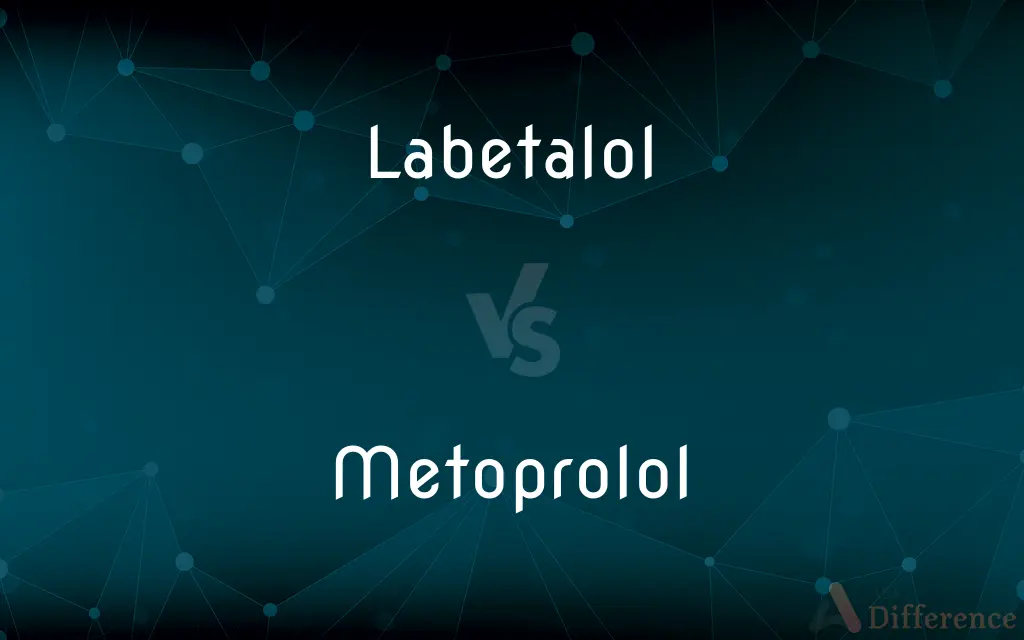Labetalol vs. Metoprolol — What's the Difference?
By Urooj Arif & Fiza Rafique — Updated on March 24, 2024
Labetalol is a combined alpha and beta-blocker used for treating high blood pressure, while Metoprolol is a selective beta-1 blocker primarily used for heart diseases and hypertension.

Difference Between Labetalol and Metoprolol
Table of Contents
ADVERTISEMENT
Key Differences
Labetalol works by blocking both alpha and beta-adrenergic receptors, which results in the dilation of blood vessels and a decrease in heart rate, effectively reducing blood pressure. Metoprolol, on the other hand, specifically targets beta-1 adrenergic receptors found primarily in the heart, leading to a reduction in heart rate, cardiac output, and blood pressure with minimal impact on airways and blood vessels compared to non-selective beta-blockers.
While Labetalol is often used in situations requiring rapid control of blood pressure, such as hypertensive emergencies or during pregnancy, Metoprolol is preferred for long-term management of hypertension, angina, and after a heart attack to prevent further cardiac events. This distinction is due to Labetalol’s ability to lower blood pressure quickly and its safety profile in pregnancy, whereas Metoprolol's selective action makes it suitable for patients with respiratory risks.
The side effects of Labetalol can include dizziness, fatigue, nausea, and in some cases, orthostatic hypotension (a significant drop in blood pressure when standing up). Metoprolol may also cause dizziness and fatigue, as well as cold extremities, depression, and in some individuals, difficulty breathing, especially in those with pre-existing asthma due to its beta-blocking effects, though less so than non-selective beta-blockers.
Labetalol's unique dual-action makes it a versatile option for managing blood pressure in various clinical scenarios, including in patients with certain types of heart failure where beta-blockade is needed without excessive reduction in peripheral resistance. Metoprolol is highly regarded for its cardiovascular benefits, especially in reducing the risk of repeated heart attacks and managing heart rate in conditions like atrial fibrillation.
In choosing between Labetalol and Metoprolol, healthcare providers consider the patient’s specific medical condition, potential side effects, and the drug's pharmacological action. For instance, Labetalol may be preferred in pregnant women or in acute settings, while Metoprolol is often chosen for its protective effects on the heart over the long term, particularly in patients with a history of heart attacks or those at risk for cardiac events.
ADVERTISEMENT
Comparison Chart
Mechanism of Action
Blocks alpha and beta-adrenergic receptors
Selectively blocks beta-1 adrenergic receptors
Primary Use
Hypertensive emergencies, pregnancy
Hypertension, angina, post-myocardial infarction
Speed of Action
Rapid
Gradual
Side Effects
Dizziness, fatigue, orthostatic hypotension
Dizziness, cold extremities, depression, breathing difficulties
Specific Benefits
Rapid blood pressure control, versatile in emergencies
Cardiovascular protection, safer for patients with respiratory risks
Considerations
Useful in pregnancy, acute hypertension
Long-term management of heart conditions, hypertension
Compare with Definitions
Labetalol
Often used in hypertensive emergencies.
The emergency room administered Labetalol to quickly lower the patient's blood pressure.
Metoprolol
A selective beta-1 blocker that primarily affects the heart.
Metoprolol has been effective in managing his heart rate and blood pressure.
Labetalol
May include orthostatic hypotension and fatigue.
After starting Labetalol, he experienced some dizziness when standing up quickly.
Metoprolol
Safer for patients with asthma compared to non-selective beta-blockers.
Given her asthma, Metoprolol was chosen to minimize the risk of breathing difficulties.
Labetalol
Considered safe and effective for managing hypertension in pregnancy.
She was switched to Labetalol during her pregnancy to manage her hypertension safely.
Metoprolol
Preferred for chronic heart conditions.
To reduce the risk of another heart attack, he was prescribed Metoprolol.
Labetalol
A medication that blocks both alpha and beta-adrenergic receptors.
Labetalol was prescribed to rapidly control her high blood pressure.
Metoprolol
Can include cold extremities and depression.
Since taking Metoprolol, she noticed her hands and feet felt colder.
Labetalol
Its dual-action makes it suitable for various hypertension scenarios.
Labetalol's ability to quickly reduce blood pressure made it the ideal choice for her condition.
Metoprolol
Helps prevent further cardiac events.
Metoprolol is part of his regimen to protect against future heart problems.
Labetalol
Labetalol is a medication used to treat high blood pressure and in long term management of angina. This includes essential hypertension, hypertensive emergencies, and hypertension of pregnancy.
Metoprolol
Metoprolol, sold under the brand name Lopressor, among others, is a selective β1 receptor blocker medication. It is used to treat high blood pressure, chest pain due to poor blood flow to the heart, and a number of conditions involving an abnormally fast heart rate.
Labetalol
(pharmaceutical drug) A drug that acts as an alpha- and beta-blocker, used in the treatment of hypertension.
Metoprolol
A beta-blocker drug, C15H25NO3, used in its tartrate and succinate forms to treat hypertension and angina pectoris.
Labetalol
Antihypertensive drug (trade names Trandate and Normodyne) that blocks alpha and beta-adrenergic receptors of the sympathetic nervous system (leading to a decrease in blood pressure)
Metoprolol
(pharmaceutical drug) A beta-blocking drug related to propranolol, used to treat hypertension and angina.
Metoprolol
Beta blocker (trade name Lopressor) used in treating hypertension and angina and arrhythmia and acute myocardial infarction; has adverse side effects (depression and exacerbation of congestive heart failure etc.)
Common Curiosities
Why is Metoprolol preferred for long-term heart disease management?
Due to its selective action on beta-1 receptors, it reduces heart rate and blood pressure with fewer respiratory side effects, making it suitable for chronic management and offering cardiovascular protection.
What makes Labetalol unique among blood pressure medications?
Its ability to block both alpha and beta-adrenergic receptors, offering rapid blood pressure control, especially in emergencies and pregnancy.
What are the key side effects to watch for with these medications?
For Labetalol, dizziness, fatigue, and orthostatic hypotension are common, while Metoprolol may cause dizziness, cold extremities, depression, and potentially breathing difficulties in susceptible individuals.
Can Labetalol and Metoprolol be taken together for blood pressure management?
Typically, they are not prescribed together due to overlapping effects on blood pressure and heart rate. A healthcare provider would select the most appropriate medication based on individual patient needs and conditions.
How do healthcare providers decide between Labetalol and Metoprolol for a patient?
Decision-making is based on the patient's specific health condition, potential side effects, the drug's action, and individual patient factors such as pregnancy, presence of heart disease, or risk of respiratory issues.
Can Labetalol or Metoprolol be used in asthma patients?
Metoprolol, being a beta-1 selective blocker, is generally considered safer for patients with asthma, though care is still needed. Labetalol, due to its alpha-blocking properties, may also be used but with caution.
How quickly does Labetalol work compared to Metoprolol?
Labetalol is known for its rapid action, making it suitable for acute management of high blood pressure, such as hypertensive emergencies. Metoprolol acts more gradually, making it ideal for long-term management of cardiovascular conditions.
Are there any specific conditions where one is preferred over the other?
Yes, Labetalol is often preferred in hypertensive emergencies and during pregnancy, while Metoprolol is chosen for long-term management of heart conditions and hypertension, especially in patients with a history of heart attacks.
Are there any dietary restrictions when taking Labetalol or Metoprolol?
While specific dietary restrictions are not common, it's generally advised to avoid alcohol and to be cautious with foods high in potassium or sodium. Always consult with a healthcare provider for personalized advice.
How do patients typically transition from Labetalol to Metoprolol or vice versa?
Transitioning between these medications should be managed by a healthcare provider, who will consider the patient’s current condition, the reason for the switch, and the best way to gradually adjust the dosage to avoid adverse effects.
Is it safe for pregnant women to continue Metoprolol during pregnancy, or should they switch to Labetalol?
Labetalol is commonly preferred and considered safer during pregnancy for managing high blood pressure. However, the decision to switch from Metoprolol to Labetalol would be based on the pregnant woman's health status, existing conditions, and in consultation with her healthcare provider.
Share Your Discovery

Previous Comparison
Interculturalism vs. Multiculturalism
Next Comparison
Temporospatial vs. SpatiotemporalAuthor Spotlight
Written by
Urooj ArifUrooj is a skilled content writer at Ask Difference, known for her exceptional ability to simplify complex topics into engaging and informative content. With a passion for research and a flair for clear, concise writing, she consistently delivers articles that resonate with our diverse audience.
Co-written by
Fiza RafiqueFiza Rafique is a skilled content writer at AskDifference.com, where she meticulously refines and enhances written pieces. Drawing from her vast editorial expertise, Fiza ensures clarity, accuracy, and precision in every article. Passionate about language, she continually seeks to elevate the quality of content for readers worldwide.














































